A Report on the Second Support Services Congress at MAHAK
- 13 March 22
- 513 revirew
- 0 comment
A Report on the 2nd International Congress on the Role of Supportive Bio-Psycho-Socio-Spiritual Services in Multidisciplinary Treatment of Childhood Cancer
The 2nd International Congress on the Role of Supportive Bio-Psycho-Socio-Spiritual Services in Multidisciplinary Treatment of Childhood Cancer was held by MAHAK – the Society to Support Children Suffering from Cancer on November 22-23, 2017 at MAHAK with the presence of different national and international experts in fields of medical, social work and psychology including Prof. Eric Bouffet, Head of International Society of Pediatric Oncology and a representative from Ministry of Health and Medical Education.
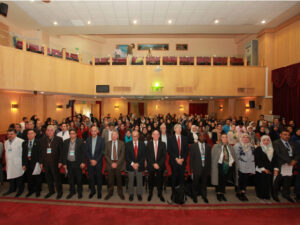 This congress was organized in 5 specialized panels, workshops and different speeches of prof. Eric Bouffet, Head of International Society of Pediatric Oncology (SIOP); Charles Mbugua, International Federation of Social Workers’ representative at United Nations; prof. Issarang Nuchprayoon from Chulalongkorn University; Prof. Claire Wakefield, Head of Behavioural Sciences Unit at Kids Cancer Centre and other experts.
This congress was organized in 5 specialized panels, workshops and different speeches of prof. Eric Bouffet, Head of International Society of Pediatric Oncology (SIOP); Charles Mbugua, International Federation of Social Workers’ representative at United Nations; prof. Issarang Nuchprayoon from Chulalongkorn University; Prof. Claire Wakefield, Head of Behavioural Sciences Unit at Kids Cancer Centre and other experts.As the opening part of “the 2nd International Congress on the Role of Supportive Bio-Psycho-Socio-Spiritual Services in Multidisciplinary Treatment of Childhood Cancer” Pariya Maavandi recited one of the versed stories of “Shahnameh” , the longest ever epic written by a single poet.
Treatment Continuation is the Most Important Goal of Multidisciplinary Treatment
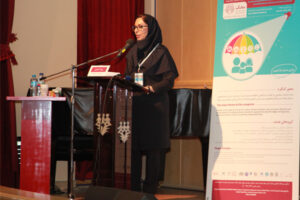 Behnaz Asangari, executive secretary of the congress and the manager of support services department at MAHAK started her speech with a report on the status of cancer-stricken children under support of MAHAK in earthquake-affected areas in west of Iran and continued her speech by the history of holding support services congresses in 2010, 2013 and 2014 respectively aiming to improve knowledge among experts in this field, creating the chance of interaction among social workers, psychologists and university professors, and making relations among supportive and medical teams and sharing experiences with other NGOs and community based organizations.
Behnaz Asangari, executive secretary of the congress and the manager of support services department at MAHAK started her speech with a report on the status of cancer-stricken children under support of MAHAK in earthquake-affected areas in west of Iran and continued her speech by the history of holding support services congresses in 2010, 2013 and 2014 respectively aiming to improve knowledge among experts in this field, creating the chance of interaction among social workers, psychologists and university professors, and making relations among supportive and medical teams and sharing experiences with other NGOs and community based organizations.She said: “the fact that in today world, one-dimensional approach will not respond human needs, indicates the necessity of multidisciplinary specialized approach in every aspect of life. According to the mission statement of MAHAK, we are responsible to support cancer-stricken children and their families in order not to feel alone during and after their child’s treatment.”
She added: “we should note that this will not be achieved except by cooperation of experts and organizations in order to update and expand our medical and supportive services day by day. At this congress, efforts have been made to enhance the level of performance and distribution of MAHAK support services relying on civil society capacity and ongoing experts’ contributions in order to provide comprehensive, integrated and effective services at the highest quality for cancer-stricken children and their families.
Empowering Social Workers and Psychologists in order to Improve the Quality of Life of Cancer-stricken Children
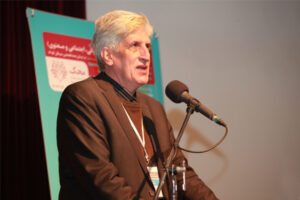 Amir Mahmood Harirchi, General Health Specialist and Social Work Instructor delivered a speech as one of the scientific secretary of the congress.
Amir Mahmood Harirchi, General Health Specialist and Social Work Instructor delivered a speech as one of the scientific secretary of the congress.Harirchi introduced the concept of “Journey with Cancer” at the beginning of his speech. In this journey, he said, the cancer-stricken child and the parents should not feel lonely. In other words, the focus is on their mental and social health. He added that in order for the child and the family to return to normal life, the assistance of different specialists from different fields is required.
He mentioned that the situation of the cancer-stricken child’s family has a direct impact on the extent to which they can tolerate the hardship and can cope with their problem. For instance, the families suffering from poverty find it really excruciating to adapt to the situation.
In the end, Amir Mahmood Harirchi, hoped that the congress would be fruitful and a protocol could be devised as its result. Moreover, he stated that MAHAK has the potential to extend its range of activities and turn into an educational, research and service center.
Systemic Thinking and Integrated Management for Achieving Multidisciplinary Treatment
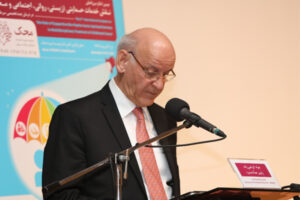 The congress opening ceremony continued by the chairman of MAHAK’s Board of Directors, Javad Karbassizadeh’s speech during which he talked about the story of founding MAHAK 26 years ago and expansion of its activity to the level that as one of the well-known NGOs supported more than 27000 cancer-stricken children so far.
The congress opening ceremony continued by the chairman of MAHAK’s Board of Directors, Javad Karbassizadeh’s speech during which he talked about the story of founding MAHAK 26 years ago and expansion of its activity to the level that as one of the well-known NGOs supported more than 27000 cancer-stricken children so far.He mentioned that during these years MAHAK has always striven to precisely assess the needs of cancer-stricken children and their families in order to provide them with the most efficient services committed to its responsibility to utilize the resources supplied by public donation which has always been one of its main concerns.
He laid emphasize on the role of utilizing multidisciplinary approach towards treatment of childhood cancer through positive cooperation of medical and supportive team in order to improve the quality of life and stated: “since 2017 and in the third strategic plan, MAHAK will focus on developing two fundamental issues of integration and comprehensiveness of services provision throughout the country in order to simplify the treatment and follow-up process for cancer-stricken children and their families.”
Expressing his hope to witness the development of humanity and empathy, he finished his speech by: “Based on its social responsibility and through organizing such specialized congresses, MAHAK tries to create an opportunity for all alike organizations and experts as the main actors of civil society to share their knowledge and experiences with each other.”
Increase the Chance of Cancer-Stricken Children’s Remission through Technology and Medical Knowledge
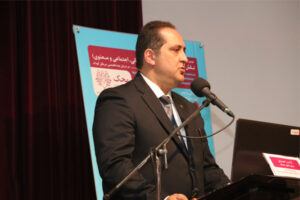 Arasb Ahmadian, CEO of MAHAK started his speech by mentioning that from 2004 to 2016, new cases have increased 14% at MAHAK annually while these children’s treatment cost have increased by 352% due to exchange rate fluctuations.
Arasb Ahmadian, CEO of MAHAK started his speech by mentioning that from 2004 to 2016, new cases have increased 14% at MAHAK annually while these children’s treatment cost have increased by 352% due to exchange rate fluctuations.He delivered a report on MAHAK’s performance during 26 years of activity and said: “during these years and especially since 15 years ago, MAHAK has striven to develop international relations through different collaboration and social responsibility projects in three sections of treatment, supportive and research with other organizations including Kurdistan Save the Children and United Nations High Commissioner for Refugees (UNHCR), Gustav Roussi and etc.”
He brought his speech to an end by mentioning MAHAK’s third strategic plan and stated: “we hope to design a system and put it in operation successfully to provide cancer-stricken children throughout the world with comprehensive and integrated treatment and supportive services and experience multidisciplinary treatment as a standard medical method at MAHAK hospital which can only be realized by collaboration of medical and supportive teams.”
Medical Team Success; Only through Multidisciplinary Treatment
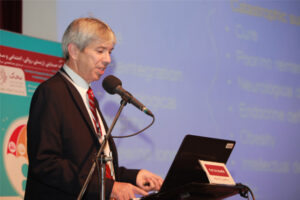 The congress’ keynote speaker, Prof. Eric Bouffet, Head of International Society of Pediatric Oncology (SIOP) delivered a speech on ‘the Importance of Multidisciplinary Treatment of Childhood Cancer’ by mentioning his experiences and knowledge regarding the field of Multidisciplinary Treatment as the Head of SIOP and as the developer of a multidisciplinary pediatric Neuro-Oncology program in year 2000.
The congress’ keynote speaker, Prof. Eric Bouffet, Head of International Society of Pediatric Oncology (SIOP) delivered a speech on ‘the Importance of Multidisciplinary Treatment of Childhood Cancer’ by mentioning his experiences and knowledge regarding the field of Multidisciplinary Treatment as the Head of SIOP and as the developer of a multidisciplinary pediatric Neuro-Oncology program in year 2000.He emphasized that having multidisciplinary treatment is only possible when all doctors and caregivers collaborate to update the care and discuss the options of treatment and make the final decisions at the time of diagnosis or when the child has REDAPS in order to provide the best treatment for his/her.
In the end he compared multidisciplinary treatment to playing soccer in which without the team spirit you will never win. It is both good for the child and for doctors because of being time-efficient and providing the doctors with the sense of satisfaction in their career. He asserted that I do not see success for the medical staff without multidisciplinary treatment.
MAHAK is a Great Social Asset to be proud of
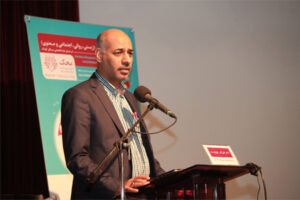 Dr. Aliakbar Haghdoost, Deputy of Strategic Planning and Coordination at Ministry of Health and Medical Education in his speech in “the 2nd International Congress on the Role of Supportive Bio-Psycho-Socio-Spiritual Services in Multidisciplinary Treatment of Childhood Cancer” thanked MAHAK for its cooperation with the Ministry of Health in identifying the gaps and accompanying the country’s social capacities. “Cancer is a result of three factors: genetic, environment and the integration of these two factors. Environmental factors account for about 40% of the causes of cancer, but can genetic factors be identified as the other cause for occurrence of cancer?” He said. The answer is no, because the interference of these two factors is very important, and in many cases people have a very different way of living in the same conditions.
Dr. Aliakbar Haghdoost, Deputy of Strategic Planning and Coordination at Ministry of Health and Medical Education in his speech in “the 2nd International Congress on the Role of Supportive Bio-Psycho-Socio-Spiritual Services in Multidisciplinary Treatment of Childhood Cancer” thanked MAHAK for its cooperation with the Ministry of Health in identifying the gaps and accompanying the country’s social capacities. “Cancer is a result of three factors: genetic, environment and the integration of these two factors. Environmental factors account for about 40% of the causes of cancer, but can genetic factors be identified as the other cause for occurrence of cancer?” He said. The answer is no, because the interference of these two factors is very important, and in many cases people have a very different way of living in the same conditions.Haghdoost considered MAHAK as a targeted and consistent organization with strategic plans, and continued: “Based on the provided explanations, I suggest MAHAK to proceed on the basis of cancer-prevention research to find out where the incidence of cancer in Iran is more, to be able to prevent the incidence of this disease by Social and environmental intervention, and elimination of risk factors.”
My Daughter’s Cancer is not Sorrowful Anymore
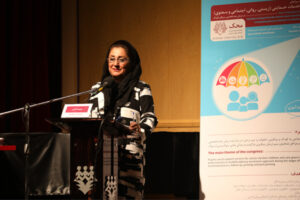 The second day of the congress initiated by Saideh Ghods, the founder of MAHAK, expressing that transferring experiences on the first day of the congress has been very fruitful and has increased MAHAK’s knowledge to provide better health and support services to cancer-stricken children and their families, shared her own experience in having a child with cancer and talked about the great change which has occurred in the situation of parents with cancer-stricken children today.
The second day of the congress initiated by Saideh Ghods, the founder of MAHAK, expressing that transferring experiences on the first day of the congress has been very fruitful and has increased MAHAK’s knowledge to provide better health and support services to cancer-stricken children and their families, shared her own experience in having a child with cancer and talked about the great change which has occurred in the situation of parents with cancer-stricken children today.She talked about her personal experiences and challenges during her child’s treatment and emphasized the importance of support services in coping with difficult situation and ultimately the treatment of cancer.
She also highlighted MAHAK’s achievements during the past quarter-century through multidisciplinary treatment.
Pediatric Patients’ Rights
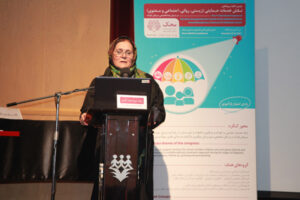 Before starting the first panel, Shiva Dowlatabadi, chairwoman of Board of Iran Psychology Association delivered her speech on ‘Pediatric Patients’ rights’ in which she mentioned the rules and regulations regarding pediatric patients that should be considered by organizations and experts who are active in the field of pediatric health.
Before starting the first panel, Shiva Dowlatabadi, chairwoman of Board of Iran Psychology Association delivered her speech on ‘Pediatric Patients’ rights’ in which she mentioned the rules and regulations regarding pediatric patients that should be considered by organizations and experts who are active in the field of pediatric health.MAHAK’s Approach towards Support Services
Provision Relying on Civil Society Capacity
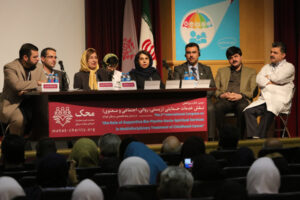 The first panel entitled ‘MAHAK’s Approach towards Support Services Provision Relying on Civil Society Capacity’ was held with the presence of Shahindokht Kharazmi, Writer and Social Analyst; Dr. Farhad Heydarian, Director of Dr. Sheikh Educational, Research and Therapeutic Center;
The first panel entitled ‘MAHAK’s Approach towards Support Services Provision Relying on Civil Society Capacity’ was held with the presence of Shahindokht Kharazmi, Writer and Social Analyst; Dr. Farhad Heydarian, Director of Dr. Sheikh Educational, Research and Therapeutic Center;Dr. Azim Mehrvar, Pediatric Hematologist Oncologist and Head of MAHAK Hospital; Shirin Sediqnejad Manager of MAHAK’s provincial support services; Noaman Abdulrahaman Ali, Project Manager of Kurdistan Save the Children (KSC) in Iraq; Dr. Mithra Ghalibafian, Head of MAHAK Hospital’s Radiation Oncology Ward; Dr. Mohammad Nasiri, Director of Health-Related Donors and Charities at Ministry of Health and Medical Education; and Ahmad Yazdanpanah, CEO of the Society to Support Children Suffering from Cancer in Khorasan.
During this panel, Noaman Abdulrahman Ali and Dr. Farhad Heydarian talked about their experiences of utilizing multidisciplinary treatment at their centers and other panel members from MAHAK shared their knowledge, experiences and challenges of utilizing multidisciplinary treatment at MAHAK hospital.
The Role of Support Services in Cancer Diagnosis
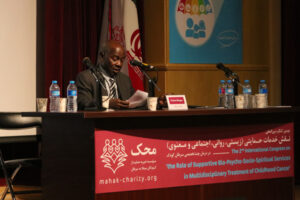 Charles Mbugua, International Federation of Social Workers’ representative at United Nations delivered his speech on the ‘Role of Support Services in Cancer Diagnosis’ in which he approached the topic from a generic social worker’s perspective and said: “cancer treatment should be holistic and addresses disease as well as its social, physical and psychological aspects.”
Charles Mbugua, International Federation of Social Workers’ representative at United Nations delivered his speech on the ‘Role of Support Services in Cancer Diagnosis’ in which he approached the topic from a generic social worker’s perspective and said: “cancer treatment should be holistic and addresses disease as well as its social, physical and psychological aspects.”He also reviewed some supportive services offered in few African countries, the challenges faced and the successes thereof and highlighted the role of social workers in the stage of diagnosis for cancer-stricken patients and their families to understand the situation and manage their normal lives through treatment and recovery and receive emotional support and dignity at the same time
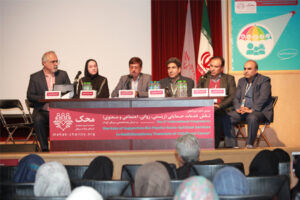 The second panel named ‘the Role of Support Services in Cancer Diagnosis’ was held with the attention to breaking bad news; distress, depression and anxiety management for the patient; and raising knowledge during diagnosis process based on age, gender and type of disease. The members of the panel were Mohammad Hatami, Faculty at Kharazmi University; Dr. Amin Rafi’ee Poor, PhD in Psychology of Health; Dr. Alireza Shokrgozar ,PhD in Psychology of Health; Hamideh Adelian, PhD in Social Work; Dr. Nasser Goudarzi, PhD in Clinical and Health Psychology; Shahram Vaziri, Psycho Oncologist.
The second panel named ‘the Role of Support Services in Cancer Diagnosis’ was held with the attention to breaking bad news; distress, depression and anxiety management for the patient; and raising knowledge during diagnosis process based on age, gender and type of disease. The members of the panel were Mohammad Hatami, Faculty at Kharazmi University; Dr. Amin Rafi’ee Poor, PhD in Psychology of Health; Dr. Alireza Shokrgozar ,PhD in Psychology of Health; Hamideh Adelian, PhD in Social Work; Dr. Nasser Goudarzi, PhD in Clinical and Health Psychology; Shahram Vaziri, Psycho Oncologist.The Role of Support Services during the Treatment
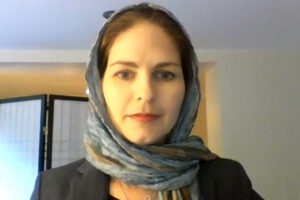 Prof. Claire Wakefield, Head of Behavioural Sciences Unit at Kids Cancer Center – Australia, who could not attend the congress due to concurrency with another conference, presented a video-conference at “the 2nd International Congress on the Role of Supportive Bio-Psycho-Socio-Spiritual Services in Multidisciplinary Treatment of Childhood Cancer”.
Prof. Claire Wakefield, Head of Behavioural Sciences Unit at Kids Cancer Center – Australia, who could not attend the congress due to concurrency with another conference, presented a video-conference at “the 2nd International Congress on the Role of Supportive Bio-Psycho-Socio-Spiritual Services in Multidisciplinary Treatment of Childhood Cancer”.She talked about her research program at Sydney Children’s hospital and some of the ways of thinking about cancer and families across age and across time and two of her study snapshots.
She stated that they focus on finding ways to help families with their way by doing family driven research and they strive to support families. She added that they do a lot of psychological research and that many of their activities overlap with the programs of MAHAK but they focus on child health more generally.
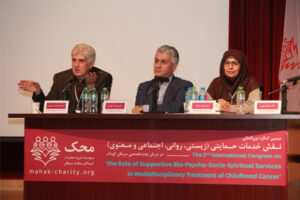 The third panel was held under the title of ‘The Role of Support Services during the Treatment’ with the focus on upholding positive outlook and unity of families; preserving the quality of life of
The third panel was held under the title of ‘The Role of Support Services during the Treatment’ with the focus on upholding positive outlook and unity of families; preserving the quality of life ofcancer-stricken children; resilience training for caregivers (families and professionals) with the presence of Amir Mahmood Harirchi, General Health Specialist and Social Work Instructor; Shahriar Shahidi, PhD in Health Clinical Psychology; Dr. Marziyeh Ghera’at, Social Work Instructor; Dr. Azim Mehrvar, Pediatric Hematologist Oncologist.
The Role of Support Services after Treatment Process and Remission
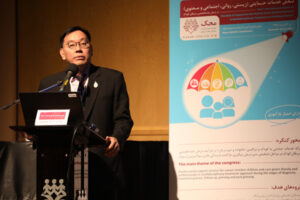 Prof. Issarang Nuchprayoon from Chulalongkorn University had a speech on ‘Home Palliative Care for Childhood Cancer’ and talked about his experiences, challenges and achievement of inaugurating home palliative care services in Thailand.
Prof. Issarang Nuchprayoon from Chulalongkorn University had a speech on ‘Home Palliative Care for Childhood Cancer’ and talked about his experiences, challenges and achievement of inaugurating home palliative care services in Thailand.In his presentation, he studied many cases with various situations who have received palliative care accordingly. He also added that recently, he is running an online project of virtual physician in which he is able to be in contact with the patients and their families in order to be aware of the patient status and prescribe the necessary advice or medicines.
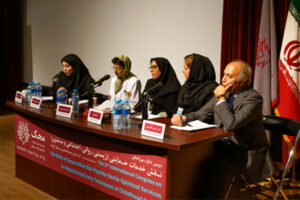 After this speech, The next panel was held entitled ‘the Role of Support Services after Treatment Process (Follow-up) and Remission’ focused on challenges and difficulties for cancer-stricken children and their families; the concept and description of support services in this stage; building trust for better cooperation between families and health professionals and motivation for continuation of the treatment process; cognitive rehabilitation and psychological support for delayed complications of cancer. Fariba Zarrani, PhD in Psychology of Health; Habib Agha Bakhshi, Social pathologist; Dr. Mithra Ghalibafian, Radiation Oncologist; Masoumeh Mousavi, Child and adolescent psychiatrist; Neda Nedaei, Master of Clinical Psychology were the members of the fourth panel.
After this speech, The next panel was held entitled ‘the Role of Support Services after Treatment Process (Follow-up) and Remission’ focused on challenges and difficulties for cancer-stricken children and their families; the concept and description of support services in this stage; building trust for better cooperation between families and health professionals and motivation for continuation of the treatment process; cognitive rehabilitation and psychological support for delayed complications of cancer. Fariba Zarrani, PhD in Psychology of Health; Habib Agha Bakhshi, Social pathologist; Dr. Mithra Ghalibafian, Radiation Oncologist; Masoumeh Mousavi, Child and adolescent psychiatrist; Neda Nedaei, Master of Clinical Psychology were the members of the fourth panel.The Role of Support Services during and Post Grieving period
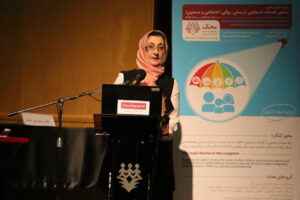 Tamar Gogatishvili, founder of Nakvalevi NGO in Georgia who is a survivor herself started her presentation by introducing Nakvalevi NGO as one with the aim of strengthening young people by giving them the skills of holistic thinking, personal leadership, self-management, success planning and to teach them how to create and maintain motivation and proactivity.
Tamar Gogatishvili, founder of Nakvalevi NGO in Georgia who is a survivor herself started her presentation by introducing Nakvalevi NGO as one with the aim of strengthening young people by giving them the skills of holistic thinking, personal leadership, self-management, success planning and to teach them how to create and maintain motivation and proactivity.She added: “we, at Nakvalevi try to contribute in walking parallel with the patient and their families along with the medical team to help them to get over this period with utmost hope. In order to achieve optimum results, social workers and volunteers acknowledge them about every stage they go through and give them psychological support.”
She continued her speech by mentioning some of supportive programs for cancer-stricken patients and also their families.
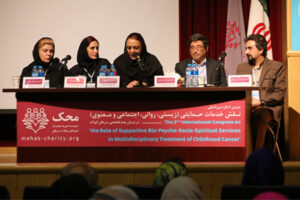 The last panel of ‘the Role of Support Services in Grieving and Post-Grieving Period’ was held with focus on international trends of grief crisis management; methods of maintaining relations with families; parents and Siblings’ psychological adjustment with loss of a brother/sister. The members were Dr. Farah Lotfi Kashani, Psychosomatic Medicine Specialist; Behnaz Asangari, Manager of Support Services of MAHAK, Sediqeh Davoodi, Head of ICU at MAHAK Hospital; Ali Zadeh Mohammadi, PhD in Clinical Psychology and Vahid Sadeghi Firoozabadi, PhD in Health Psychology.
The last panel of ‘the Role of Support Services in Grieving and Post-Grieving Period’ was held with focus on international trends of grief crisis management; methods of maintaining relations with families; parents and Siblings’ psychological adjustment with loss of a brother/sister. The members were Dr. Farah Lotfi Kashani, Psychosomatic Medicine Specialist; Behnaz Asangari, Manager of Support Services of MAHAK, Sediqeh Davoodi, Head of ICU at MAHAK Hospital; Ali Zadeh Mohammadi, PhD in Clinical Psychology and Vahid Sadeghi Firoozabadi, PhD in Health Psychology.Post-Traumatic Stress Syndrome
Nasser Salehinia, Brain and Cognitive Sciences Researcher delivered his speech on Post-Traumatic Stress Syndrome and ran a Question and Answer session after his speech for the participants.
Workshops
 Three workshops were run on Thursday, November 23 the second day of “the 2nd International Congress on the Role of Supportive Bio-Psycho-Socio-Spiritual Services in Multidisciplinary Treatment of Childhood Cancer” at MAHAK the Society to Support Children Suffering from Cancer.
Three workshops were run on Thursday, November 23 the second day of “the 2nd International Congress on the Role of Supportive Bio-Psycho-Socio-Spiritual Services in Multidisciplinary Treatment of Childhood Cancer” at MAHAK the Society to Support Children Suffering from Cancer.The first workshop was entitled “Communication for Palliative Care” instructed by Professor Issarang Nuchprayoon, the second workshop’s instructors were Bahman Bahmani and Dr. Shadi Norouz Ali with the title of “Caring for Caregivers (Professionals- Families)” and the third one was held under the title of “Book and Pediatric Patient” by Marzieh Shahkarami.
Each workshop lasted two hours and many participants of different fields attended them.
